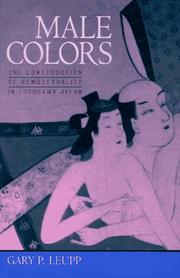| Listing 1 - 2 of 2 |
Sort by
|

ISBN: 052091919X 0585106037 9780520919198 9780585106038 0520086279 Year: 1995 Publisher: Berkeley University of California Press
Abstract | Keywords | Export | Availability | Bookmark
 Loading...
Loading...Choose an application
- Reference Manager
- EndNote
- RefWorks (Direct export to RefWorks)
Tokugawa Japan ranks with ancient Athens as a society that not only tolerated, but celebrated, male homosexual behavior. Few scholars have seriously studied the subject, and until now none have satisfactorily explained the origins of the tradition or elucidated how its conventions reflected class structure and gender roles. Gary P. Leupp fills the gap with a dynamic examination of the origins and nature of the tradition. Based on a wealth of literary and historical documentation, this study places Tokugawa homosexuality in a global context, exploring its implications for contemporary debates on the historical construction of sexual desire. Combing through popular fiction, law codes, religious works, medical treatises, biographical material, and artistic treatments, Leupp traces the origins of pre-Tokugawa homosexual traditions among monks and samurai, then describes the emergence of homosexual practices among commoners in Tokugawa cities. He argues that it was "nurture" rather than "nature" that accounted for such conspicuous male/male sexuality and that bisexuality was more prevalent than homosexuality. Detailed, thorough, and very readable, this study is the first in English or Japanese to address so comprehensively one of the most complex and intriguing aspects of Japanese history.
Male homosexuality --- Gender & Ethnic Studies --- Social Sciences --- Gay & Lesbian Studies --- Homosexuality, Male --- Homosexuality --- Men --- History. --- History --- Sexual behavior --- Japan --- Social life and customs. --- Nanshoku. --- Homosexualité masculine --- Social life and customs --- Tokugawa period, 1600-1868 --- Nanshoku --- Male homosexuality. --- academic. --- artistic treatments. --- asia. --- asian history. --- biographical material. --- bisexuality. --- class structure. --- commoners. --- cultural history. --- early modern jaan. --- gay studies. --- gay. --- gender roles. --- global context. --- historical documentation. --- homosexual traditions. --- japanese history. --- law codes. --- lgbt history. --- literary documentation. --- male homosexual behavior. --- medical treatises. --- monks. --- politics. --- popular fiction. --- queer history. --- religious works. --- samurai. --- sexual desire. --- sexual expression. --- sexual relations. --- sexuality. --- tokugawa bakufu. --- tokugawa japan.
Book
ISBN: 9780691134956 0691134952 9786613589330 1400842271 1280494107 9781400842278 9781280494109 Year: 2012 Publisher: Princeton, N.J. Princeton University Press
Abstract | Keywords | Export | Availability | Bookmark
 Loading...
Loading...Choose an application
- Reference Manager
- EndNote
- RefWorks (Direct export to RefWorks)
Established in 221 BCE, the Chinese empire lasted for 2,132 years before being replaced by the Republic of China in 1912. During its two millennia, the empire endured internal wars, foreign incursions, alien occupations, and devastating rebellions--yet fundamental institutional, sociopolitical, and cultural features of the empire remained intact. The Everlasting Empire traces the roots of the Chinese empire's exceptional longevity and unparalleled political durability, and shows how lessons from the imperial past are relevant for China today. Yuri Pines demonstrates that the empire survived and adjusted to a variety of domestic and external challenges through a peculiar combination of rigid ideological premises and their flexible implementation. The empire's major political actors and neighbors shared its fundamental ideological principles, such as unity under a single monarch--hence, even the empire's strongest domestic and foreign foes adopted the system of imperial rule. Yet details of this rule were constantly negotiated and adjusted. Pines shows how deep tensions between political actors including the emperor, the literati, local elites, and rebellious commoners actually enabled the empire's basic institutional framework to remain critically vital and adaptable to ever-changing sociopolitical circumstances. As contemporary China moves toward a new period of prosperity and power in the twenty-first century, Pines argues that the legacy of the empire may become an increasingly important force in shaping the nation's future trajectory.
Political culture --- Political science --- Imperialism --- Ideology --- History --- Philosophy --- China --- Politics and government --- History. --- Politics and government. --- S06/0200 --- China: Politics and government--Government and political institutions: general and before 1911 --- Colonialism --- Empires --- Expansion (United States politics) --- Neocolonialism --- Administration --- Civil government --- Commonwealth, The --- Government --- Political theory --- Political thought --- Politics --- Science, Political --- Knowledge, Theory of --- Psychology --- Thought and thinking --- Anti-imperialist movements --- Caesarism --- Chauvinism and jingoism --- Militarism --- Social sciences --- State, The --- Philosophy&delete& --- All-under-Heaven. --- Chinese emperor. --- Chinese emperorship. --- Chinese empire. --- Chinese history. --- Chinese imperial experience. --- Chinese intellectuals. --- Chinese political culture. --- Chinese political system. --- Republic of China. --- administrative power. --- balances. --- bureaucracy. --- checks. --- commoners. --- contemporary China. --- cultural foundations. --- depersonalization. --- educated elite. --- flawed morality. --- fragmentation. --- government apparatus. --- historical changes. --- imperial history. --- imperial ideology. --- imperial political culture. --- imperial political structure. --- imperial unification. --- institution. --- intellectual elitism. --- large-scale uprisings. --- local elites. --- modern China. --- modernity. --- monarch. --- monarchism. --- monarchy. --- omnipotent. --- political actors. --- political durability. --- political dynamics. --- political unity. --- popular uprisings. --- power. --- prosperity. --- rebellion. --- scholar-officials. --- shi. --- social power. --- stateХlite interactions. --- tianxia. --- unified empire. --- unity. --- voluntary attachment. --- Political culture - China - History --- Political science - China - Philosophy - History --- Imperialism - China - History --- Ideology - China - History --- China - Politics and government
| Listing 1 - 2 of 2 |
Sort by
|

 Search
Search Feedback
Feedback About
About Help
Help News
News